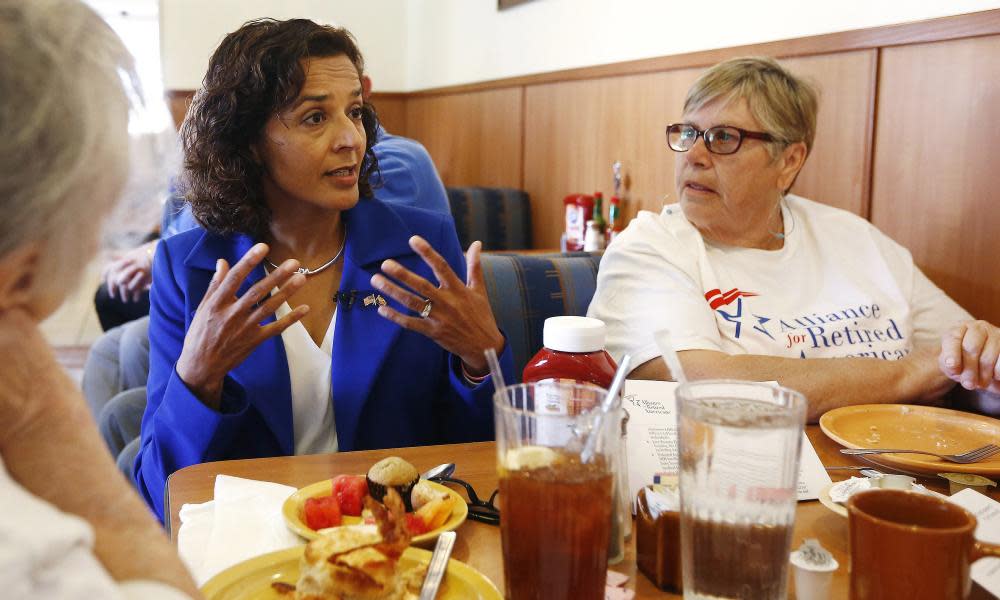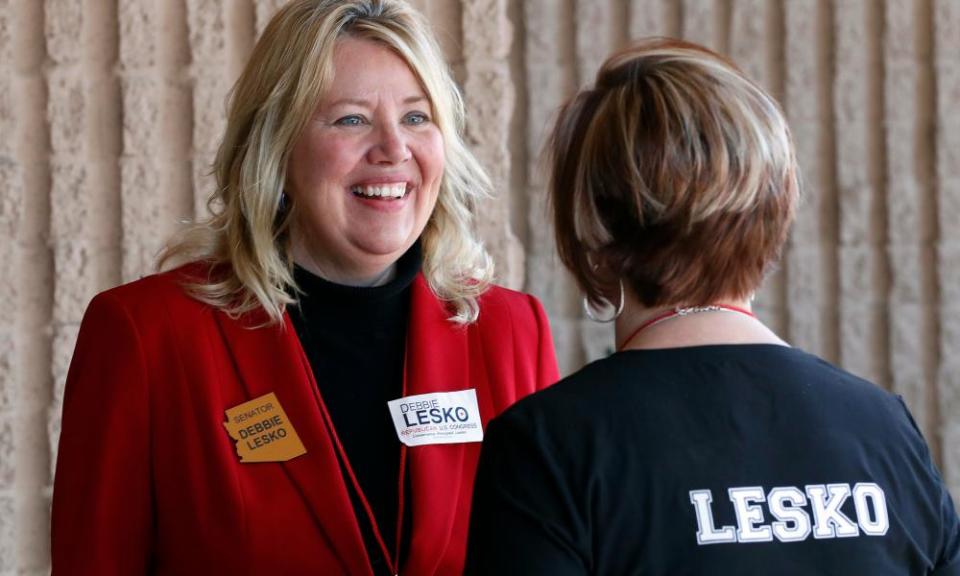Arizona election is bellwether of Democratic enthusiasm in GOP stronghold

Arizona’s eighth congressional district in Phoenix’s western suburbs is perhaps best known as a winter retreat for midwestern snowbirds – a sunny destination for retirees where cars share the road with golf carts. What the conservative district is not known for is electoral suspense.
Yet on Tuesday the Republican stronghold will play host to a special election that is being closely watched as a potential bellwether of Democratic enthusiasm ahead of the fall midterm elections.
Arizona has emerged as a centerpiece in the battle for control of Congress 2018, featuring one of the most contested Senate races in the country. Republicans are defending the seat being vacated by retiring senator Jeff Flake, while Democrats are bullish on their chances of winning an open congressional seat. Meanwhile, the state’s other senator, John McCain, has been absent from Washington since December while he recovers form an aggressive form of brain cancer in Arizona.
In the eighth congressional district, Republican Debbie Lesko, a state senator, is the strong favorite to replace Trent Franks, the veteran GOP congressman who resigned in December amid allegations of sexual misconduct. But Democrat Hiral Tipirneni, a political newcomer and former emergency room physician, has mounted a competitive challenge for the seat, with polls showing a tightening race in the final weeks of the campaign.
Few expect an upset here. Early voting returns favor Republicans and recent polling show Lesko winning by anywhere from 10 and six points to a virtual tie. Donald Trump won the district by 21 points in 2016.

Analysts are monitoring the race as a test of whether Democrats capitalize on Trump’s unpopularity in a year when the president’s party historically loses seats in Congress.
A narrow margin of victory for Lesko in a district where Democrats have not fielded a candidate since 2012 could “set off alarm bells” for Republicans, said Geoffrey Skelley, a political analyst at the University of Virginia’s Center for Politics.
“The question is: Does the Republican win by single or double digits?” he said, adding that a spread of less than 10 points would be “notable”, considering Trump’s dominance there in 2016.
The race has drawn parallels to last month’s special election in western Pennsylvania, where the Democrat Conor Lamb won a shock victory in a traditionally conservative district in western Pennsylvania that Trump carried by 20 points.
But political strategists caution that comparisons between the two districts are only superficially. One key difference, Republicans hold a 17-point voter registration advantage in the Arizona district, unlike in the Pennsylvania district, which had more registered Democrats.
“District eight is a hardcore, white Republican district that is about as red as red can be,” said Chuck Coughlin, a GOP consultant in the state, adding: “The math just doesn’t add up.”
Voting here began several weeks ago and according to early voting figures tracked by the Secretary of State’s Office, nearly half the ballots returned have been from Republican voters. By comparison, 28% of the ballots received were from registered Democrats while 23% were from independents. The numbers only reflect the voters’ party identification, and not how they voted.
Despite the long odds, Democrats in the district are energized in a way that local officials say they haven’t seen at any point in recent memory. This spring the state party opened a field office in the West Valley – a first as far as anyone there can recall – in a sign that Democrats committed to competing in even the reddest corners of the state.
In an interview with the Guardian last month, Tipirneni said that recent Democratic victories in Pennsylvania and Alabama show that “conventional wisdom doesn’t apply”.
She added: “There’s a lot of reason to think that Arizona can absolutely be next.”
Republicans are not leaving anything to chance. The Republican National Committee, National Republican Campaign Committee and the Congressional Leadership Fund have collectively spent more than $1m to defend the seat – a sign, Democrats say, of their concern. Democrats have notably stayed out of the race, though a handful of progressive groups have swooped in with support.
Lesko has aligned herself with Trump, especially on immigration and border security, and supports his desire to build a wall along the southern US border. In a debate, Lesko sought to cast Tipirneni as too liberal for the district and attacked the Democrat for opposing Trump’s wall and the Republican tax plan.
Tipirneni countered with an ad that called Lesko “everything you hate about politics”. During the campaign, Tipirneni focused on healthcare and promised to protect Social Security and Medicare, federal programs that are popular with older voters.
On Monday night, Tipirneni held a final campaign rally with former Arizona congresswoman Gabby Giffords and her husband, Mark Kelly, in Surprise.
At a Saturday campaign event, Lesko rallied with Arizona congresswoman Martha McSally, a Republican running for the US Senate, who warned that a narrow victory in Arizona’s eighth congressional district could send the wrong message.
“She has got to crush this,” McSally said, imploring voters to turn in their ballots. “We’ve got to make sure that this district knows, this state knows and this country knows: CD 8 is red, Arizona is red.”

 Yahoo News
Yahoo News 
